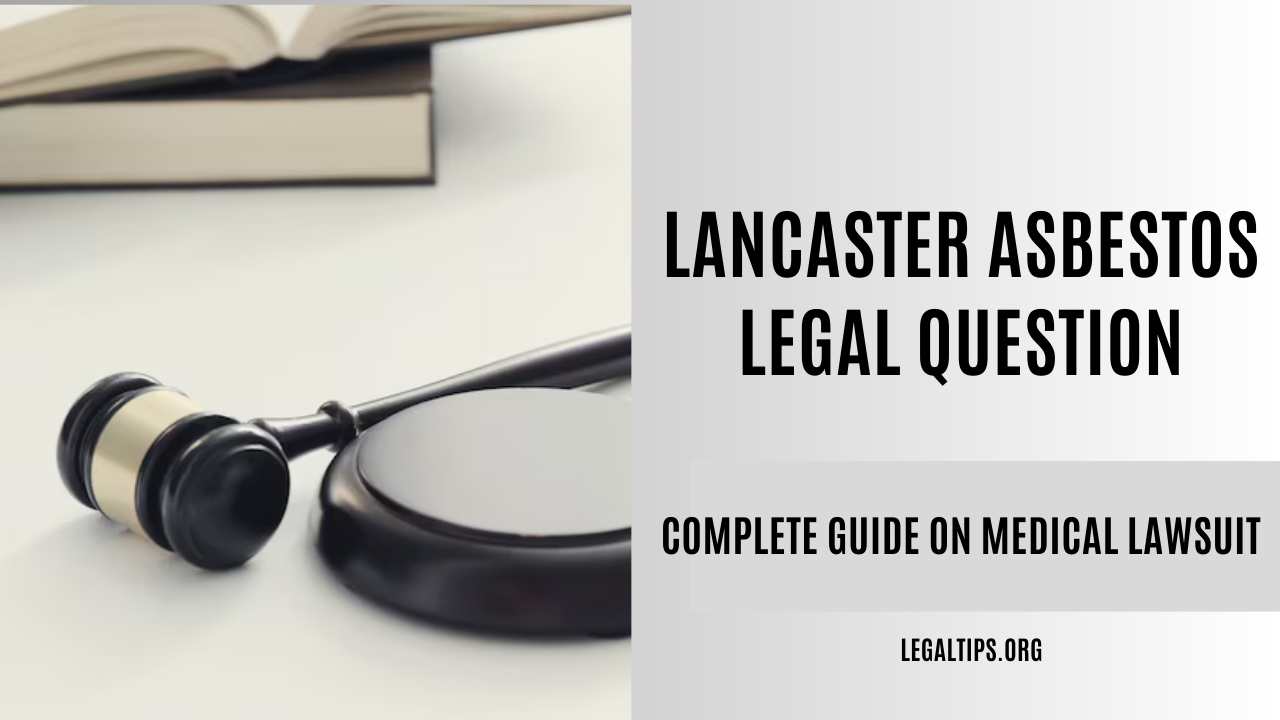Asbestos is a fibrous, naturally occurring mineral that is hazardous to health. The legacy of asbestos in Lancaster, Pennsylvania has left a significant impact, particularly on the legal system. The Lancaster Asbestos legal question usually revolves around its health risks, manufacturers’ responsibilities, and victims’ rights.
The legal framework for asbestos claims in Lancaster is built upon a combination of federal and state laws. These laws provide protection from asbestos exposure and compensation if exposure causes illness.
It is crucial to understand these laws for anyone who’s considering legal action due to asbestos exposure. Let’s discuss the key legal questions that surround asbestos cases.
Contents
- 1 Key Regulations and Laws Affecting Asbestos Cases
- 2 The Role of Asbestos Lawyers in Lancaster
- 3 Identifying Potential Asbestos Exposure Areas in Lancaster
- 4 What are Legal Lancaster Asbestos Legal Question?
- 5 Detailed Answers for Asbestos Cases
- 5.1 1. Why Asbestos is a Legal Concern?
- 5.2 2. How Can You Identify Asbestos Exposure?
- 5.3 3. What Are My Legal Rights If I’ve Been Exposed to Asbestos in Lancaster?
- 5.4 4. How Do I Know If I Have an Asbestos-Related Claim?
- 5.5 5. What Is the Statute of Limitations for Asbestos Claims in Lancaster?
- 5.6 6. Can I Sue for Asbestos Exposure If I Am Not Sick Yet?
- 5.7 7. Are There Any Asbestos Trust Funds Available for Lancaster Residents?
- 5.8 8. Can Veterans in Lancaster File Asbestos Claims?
- 5.9 9. Who Can Be Held Liable for Asbestos Exposure in Lancaster?
- 5.10 10. What Compensation Is Available for Asbestos-Related Claims?
- 6 Types of Legal Claims for Asbestos-Related Illnesses
- 7 How to Document Asbestos Exposure for Legal Purposes?
- 8 How to Choose the Right Asbestos Lawyer in Lancaster?
- 9 Future Trends in Asbestos Legal Issues and Advocacy
Key Regulations and Laws Affecting Asbestos Cases
Several key regulations and laws govern asbestos cases in Lancaster:
- Federal Laws: The Environmental Protection Agency (EPA) regulates asbestos under the Clean Air Act and the Toxic Substances Control Act. These laws set standards for asbestos handling, abatement, and disposal.
- Occupational Safety and Health Administration (OSHA): OSHA sets workplace safety standards to protect workers from asbestos exposure.
- State Laws: Pennsylvania has additional regulations that address asbestos exposure, particularly concerning worker safety and building codes.
These laws outline the legal rights of asbestos victims and the responsibilities of employers, building owners, and manufacturers.
The Role of Asbestos Lawyers in Lancaster
Asbestos lawyers specialize in handling cases involving asbestos exposure and related illnesses. They are essential in navigating the complex legal ground. Lawyers help victims to understand their rights and to secure compensation.
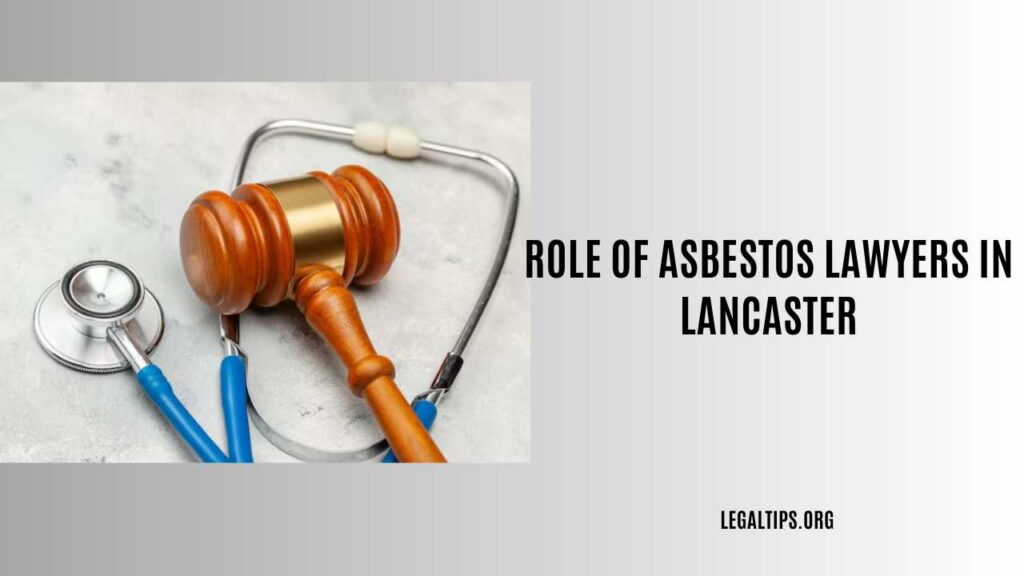
A skilled asbestos lawyer will handle everything from filing claims to negotiating settlements or representing clients in court.
Identifying Potential Asbestos Exposure Areas in Lancaster
Asbestos can be found in many older buildings and facilities throughout Lancaster. The following are common areas:
- Old factories and industrial buildings
- Schools and hospitals constructed before the 1980s
- Residential buildings with original insulation or roofing materials
Also Read: Dallas Asbestos Legal Questions: What Every Resident Needs to Know
What are Legal Lancaster Asbestos Legal Question?
Lancaster has faced its share of asbestos-related issues due to its industrial history. Several legal questions frequently arise:
- Why Asbestos is a Legal Concern?
- How Can You Identify Asbestos Exposure?
- What Are My Legal Rights If I’ve Been Exposed to Asbestos in Lancaster?
- How Do I Know If I Have an Asbestos-Related Claim?
- What Is the Statute of Limitations for Asbestos Claims in Lancaster?
- Can I Sue for Asbestos Exposure If I Am Not Sick Yet?
- Are There Any Asbestos Trust Funds Available for Lancaster Residents?
- Can Veterans in Lancaster File Asbestos Claims?
- Who Can Be Held Liable for Asbestos Exposure in Lancaster?
- What Compensation Is Available for Asbestos-Related Claims?
These questions are just the tip of the iceberg when navigating asbestos-related legal matters.
Detailed Answers for Asbestos Cases
Below are common answers for Lancaster Asbestos legal question:
1. Why Asbestos is a Legal Concern?
The primary reason asbestos has become a significant legal concern is that it causes serious medical conditions, such as mesothelioma, asbestosis, and lung cancer. These diseases often have long latency periods, meaning symptoms may not appear until decades after exposure. A delay in identifying the source of exposure complicates legal proceedings.
2. How Can You Identify Asbestos Exposure?
Identifying asbestos exposure isn’t always straightforward. The most common symptoms of asbestos-related illnesses include shortness of breath, persistent cough, and chest pain.
If you suspect exposure, it’s crucial to seek medical attention immediately. A timely diagnosis improves treatment outcome and strengthens your legal case.
3. What Are My Legal Rights If I’ve Been Exposed to Asbestos in Lancaster?
If you’ve been exposed to asbestos in Lancaster, you have the right to seek compensation for any health issues. This includes the right to file lawsuits against employers, manufacturers and property owners who failed to warn or protect against asbestos exposure.
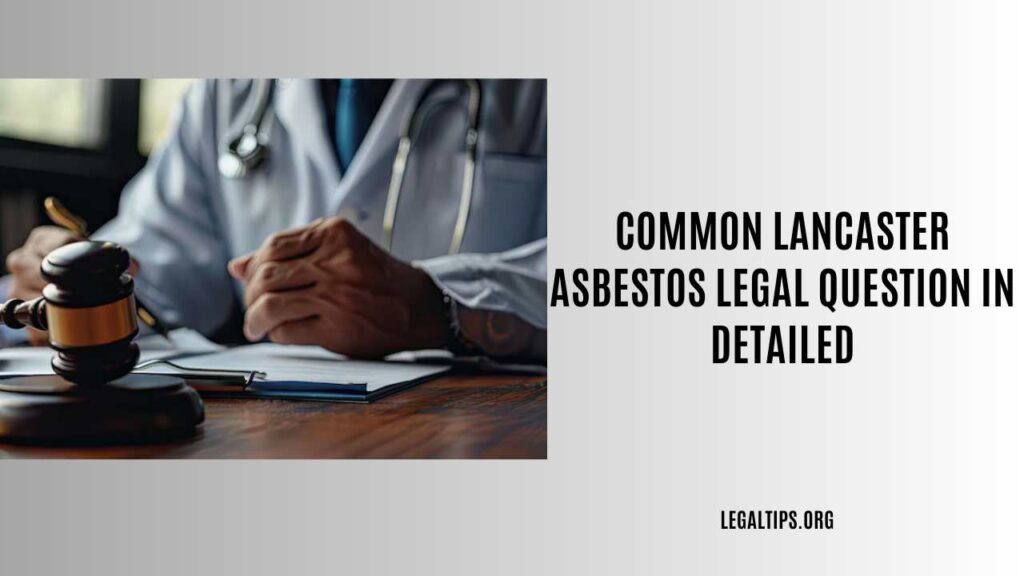
It’s important to consult with a specialized asbestos attorney to understand your specific legal rights and options.
4. How Do I Know If I Have an Asbestos-Related Claim?
The first requirement is to have a diagnosis of a disease related to asbestos, such as mesothelioma, lung cancer, or asbestosis. You should be able to establish a connection between your illness and asbestos exposure.
This may involve proving your presence at a job site, building, or using products known to contain asbestos.
5. What Is the Statute of Limitations for Asbestos Claims in Lancaster?
A person’s right to file an asbestos claim in Pennsylvania begins when they diagnosed with an asbestos-related disease. The filing deadline for lawsuits is two years after the date of diagnosis.
The statute of limitations is also two years from the date of death due to an asbestos-related illness. Time limits are strictly enforced, so it’s important to act quickly.
6. Can I Sue for Asbestos Exposure If I Am Not Sick Yet?
You cannot file a lawsuit simply based on asbestos exposure without an actual diagnosis of an asbestos-related illness. If you have experienced potential health risks, consult with an attorney about your options and preventative measures.
7. Are There Any Asbestos Trust Funds Available for Lancaster Residents?
Many companies that manufactured or used asbestos have established trust funds to compensate victims. These funds are available to individuals diagnosed with asbestos-related diseases. If you are eligible to file a claim with one of these trust funds, an asbestos attorney can assist you.
8. Can Veterans in Lancaster File Asbestos Claims?
Veterans exposed to asbestos during military service may be eligible to file claims. The military used asbestos in ships, vehicles, and buildings, which led to widespread exposure.
Veterans can seek compensation through the Department of Veterans Affairs (VA) and may also be eligible to file lawsuits against manufacturers.
9. Who Can Be Held Liable for Asbestos Exposure in Lancaster?
Liability for asbestos exposure in Lancaster can be attributed to various parties depending on the circumstances. An employer may be held responsible for inadequate safety measures or asbestos warnings at work.
10. What Compensation Is Available for Asbestos-Related Claims?
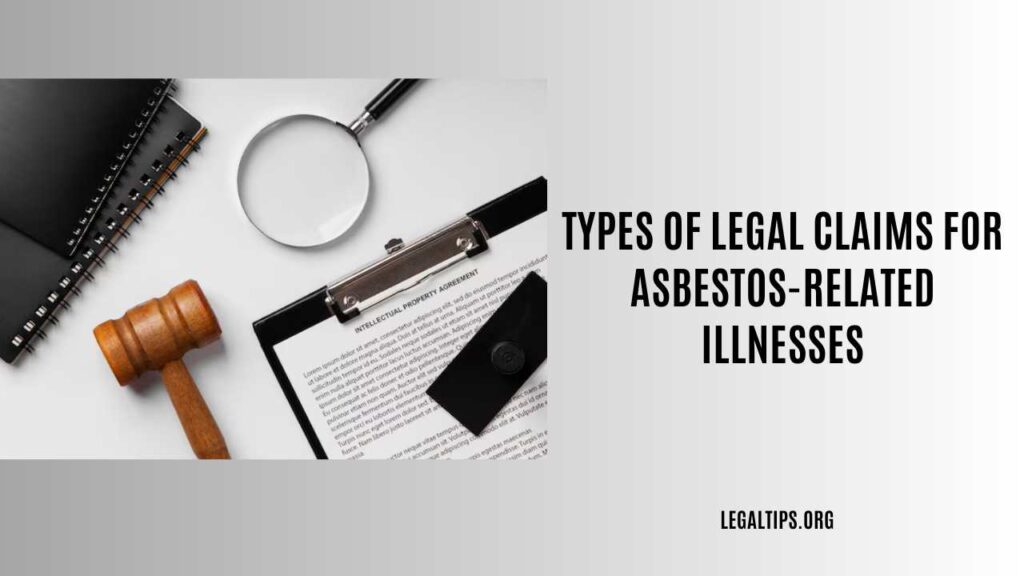
Victims of asbestos exposure in Lancaster may be entitled to various forms of compensation. This can include coverage for medical expenses, such as the costs of diagnosis, treatment, and ongoing care for asbestos-related diseases.
Financial compensation is available for lost wages due to illnesses and incapacitations. Those suffering from asbestos-related illnesses can seek compensation for pain and suffering.
Types of Legal Claims for Asbestos-Related Illnesses
There are several types of legal claims that individuals affected by asbestos exposure in Lancaster can pursue:
- Personal Injury Claims: Asbestos-related illnesses affected individuals, who seek compensation for medical expenses, lost wages, and pain and suffering.
- Wrongful Death Claims: Those filed by the estates of people who died from asbestos-related diseases. These claims seek compensation for funeral expenses, loss of income, and loss of companionship.
- Workers’ Compensation Claims: Asbestos-exposed workers may qualify for workers’ compensation benefits, covering medical costs and a portion of lost wages.
Each type of claim has its requirements and potential outcomes, making it important to choose the right legal path.
How to Document Asbestos Exposure for Legal Purposes?
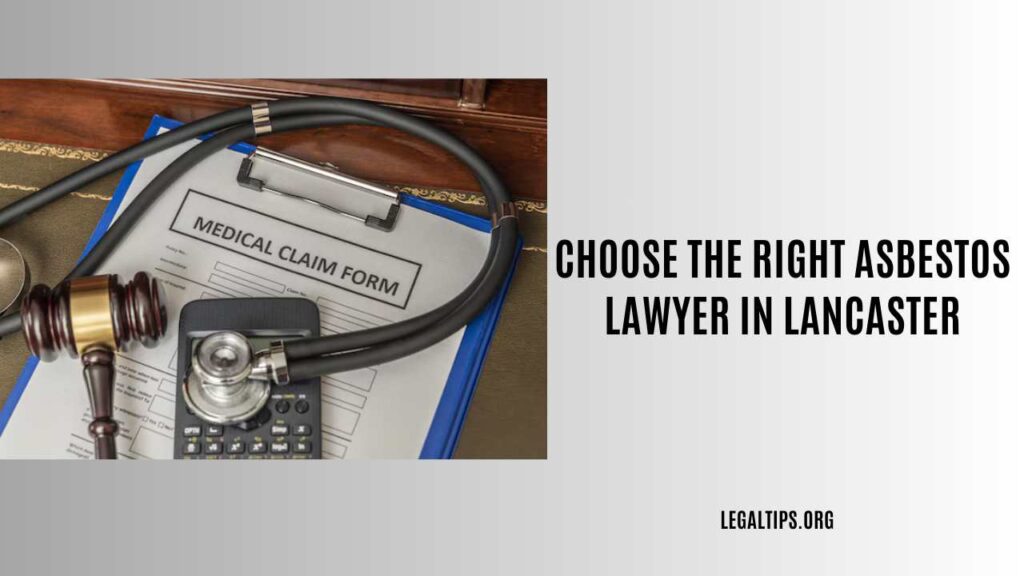
Documenting asbestos exposure is critical for any legal case. Here are some steps to effectively document exposure:
- Collecting Records: Gather employment, residency, and medical records that show time spent in locations where asbestos exposure might have occurred.
- Medical Documentation: Obtain medical records that confirm the diagnosis of an asbestos-related disease. This includes doctor’s reports, test results, and treatment plans.
- Photographic Evidence: Take photographs of asbestos-containing materials, warning signs, and conditions that indicate asbestos presence.
- Witness Statements: Gather statements from coworkers, neighbors, or others who can testify about the asbestos exposure.
How to Choose the Right Asbestos Lawyer in Lancaster?
Choosing the right lawyer is a crucial decision that can impact the success of an asbestos case. Here are some factors to consider:
- Experience: Look for a lawyer with a proven track record in handling asbestos cases. This specific area of law requires experience.
- Reputation: Research the lawyer’s reputation through reviews, testimonials, and professional ratings. A lawyer with a good reputation is more likely to have the expertise and resources needed to handle your case.
- Resources: Ensure the lawyer or law firm has the resources to thoroughly investigate and build a strong case. This includes access to expert witnesses, medical professionals, and investigative teams.
Future Trends in Asbestos Legal Issues and Advocacy
The Lancaster Asbestos legal question will continue to evolve in the future. There may be increased regulatory efforts to limit asbestos use and ensure safe removal and disposal practices.
Public awareness campaigns and education initiatives will continue to be important for asbestos prevention and victim advocacy. The ongoing advocacy effort aims to secure funding for research into asbestos-related diseases.

